Abstract
In this paper we investigate an approach to semi-supervised learning based on randomized propositionalization, which allows for applying standard propositional classification algorithms like support vector machines to multi-relational data. Randomization based on random relational rules can work both with and without a class attribute and can therefore be applied simultaneously to both the labeled and the unlabeled portion of the data present in semi-supervised learning.
An empirical investigation compares semi-supervised propositionalization to standard propositionalization using just the labeled data portion, as well as to a variant that also just uses the labeled data portion but includes the label information in an attempt to improve the resulting propositionalization. Preliminary experimental results indicate that propositionalization generated on the full dataset, i.e. the semi- supervised approach, tends to outperform the other two more standard approaches.
Access this chapter
Tax calculation will be finalised at checkout
Purchases are for personal use only
Preview
Unable to display preview. Download preview PDF.
References
Anderson, G., Pfahringer, B.: Clustering Relational Data based on Randomized Propositionalization. In: Proceedings International Conference on Inductive Logic Programming 2007 (ILP 2007). Springer, Heidelberg (2007)
Breiman, L.: Random Forests. Machine Learning 45(1), 5–32 (2001)
de Castro Dutra, I., Page, D., Santos Costa, V., Shavlik, J.: An Empirical Evaluation of Bagging in Inductive Logic Programming. In: Matwin, S., Sammut, C. (eds.) ILP 2002. LNCS (LNAI), vol. 2583. Springer, Heidelberg (2003)
Chapelle, O., Schölkopf, B., Zien, A.: Semi-Supervised Learning. MIT Press, Cambridge (2006)
Dietterich, T., Lathrop, R., Lozano-Perez, T.: Solving the multiple-instance problem with axis-parallel rectangles. Artificial Intelligence 89, 31–71 (1997)
Džeroski, S., Schulze-Kremer, S., Heidtke, K.R., Siems, K., Wettschereck, D.: Applying ILP to Diterpene Structure Elucidation from 13C NMR Spectra. In: Proc. 6th Int. Workshop on Inductive Logic Programming, pp. 41–54 (1996)
Freund, Y., Mason, L.: The Alternating Decision Tree Learning Algorithm. In: Proceedings of the Sixteenth International Conference on Machine Learning (ICML 1999). Morgan Kaufmann, San Francisco (1999)
Giordana, A., Saitta, L.: Phase Transitions in Relational Learning. Machine Learning 41(2), 217–251 (2000)
Horváth, T., Wrobel, S., Bohnebeck, U.: Relational Instance-Based Learning with Lists and Terms. Machine Learning 43, 53–80 (2001)
King, R.D., Srinivasan, A., Dehaspe, L.: Warmr: A Data Mining Tool for Chemical Data. Journal of Computer Aided Molecular Design 15, 173–181 (2001)
Kleinberg, E.M.: On the Algorithmic Implementation of Stochastic Discrimination. IEEE Transactions on Pattern Analysis and Machine Intelligence 22(5), 473–490 (2000)
Kramer, S., Lavrac, N., Flach, P.: Propositionalization Approaches to Relational Data Mining. Relational Data Mining. Springer, Heidelberg (2001)
Krogel, S., Scheffer, T.: Multi-Relational Learning, Text Mining, and Semi-Supervised Learning for Functional Genomics. Machine Learning 57, 61–81 (2004)
Muggleton, S.: Inverse entailment and Progol. New Generation Computing, Special issue on Inductive Logic Programming 13(3-4), 245–286 (1995)
Pfahringer, B., Leschi, C., Reutemann, P.: Scaling Up Semi-supervised Learning: An Efficient and Effective LLGC Variant. In: Zhou, Z.-H., Li, H., Yang, Q. (eds.) PAKDD 2007. LNCS (LNAI), vol. 4426, pp. 236–247. Springer, Heidelberg (2007)
Platt, J.: Machines using Sequential Minimal Optimization. In: Schoelkopf, B., Burges, C., Smola, A. (eds.) Advances in Kernel Methods - Support Vector Learning. MIT Press, Cambridge (1998)
Ping, L., Zhe, W., Chunguang, Z.: A Spectrum-Based Support Vector Algorithm for Relational Data Semi-supervised Classification. In: Proceedings of the 13th International Conference on Neural Information Processing, pp. 801–810 (2006)
Quinlan, J.R.: Learning logical definitions from relations. Machine Learning 5, 239–266 (1990)
Srinivasan, A., Muggleton, S., King, R.D., Sternberg, M.J.E.: Mutagenesis: ILP experiments in a non-determinate biological domain. In: Proceedings of the Fourth Inductive Logic Programming Workshop (1994)
Srinivasan, A., Muggleton, S., King, R.D., Sternberg, M.J.E.: Carcinogenesis Predictions Using ILP. In: Proceedings of the 7th International Workshop on Inductive Logic Programming (1997), pp. 273–887 (1994)
Woźnica, A., Kalousis, A., Hilario, M.: Kernels over Relational Algebra Structures. In: Ho, T.-B., Cheung, D., Liu, H. (eds.) PAKDD 2005. LNCS (LNAI), vol. 3518, pp. 588–598. Springer, Heidelberg (2005)
Zelezny, F., Lavrac, N.: Propositionalization-Based Relational Subgroup Discovery with RSD. Machine Learning 62(1-2), 33–63 (2006)
Zhou, D., Huang, J., Schölkopf, B.: Learning from labeled and unlabeled data on a directed graph. In: Proc. of the 22nd International Conference on Machine Learning (ICML 2005), Bonn, Germany, August 2005, pp. 1041–1048 (2005)
Author information
Authors and Affiliations
Editor information
Rights and permissions
Copyright information
© 2008 Springer-Verlag Berlin Heidelberg
About this paper
Cite this paper
Anderson, G., Pfahringer, B. (2008). Exploiting Propositionalization Based on Random Relational Rules for Semi-supervised Learning. In: Washio, T., Suzuki, E., Ting, K.M., Inokuchi, A. (eds) Advances in Knowledge Discovery and Data Mining. PAKDD 2008. Lecture Notes in Computer Science(), vol 5012. Springer, Berlin, Heidelberg. https://doi.org/10.1007/978-3-540-68125-0_43
Download citation
DOI: https://doi.org/10.1007/978-3-540-68125-0_43
Publisher Name: Springer, Berlin, Heidelberg
Print ISBN: 978-3-540-68124-3
Online ISBN: 978-3-540-68125-0
eBook Packages: Computer ScienceComputer Science (R0)

